
Jan. 6, 2022, 1:30 p.m. ETJan. 6, 2022, 1:30 p.m. ET
The New York Times

Nicholas Fandos
I had written stories as early as December forecasting that Jan. 6 would be the last stand of then-President Trump's attempt to overturn his election loss. I knew what Republican members of Congress were planning to do inside the Capitol on Jan. 6 and knew Trump was egging them on. But it wasn't until early that afternoon, when I could actually hear the chants of the crowd massing outside through the thick Capitol walls, that I began to have any inkling that the day was going to be anything more than a dramatic but futile legislative exercise.
Maybe I was just dense, but I figured lots of people might gather and protest, Republican lawmakers would howl with fury, and then we would all go home without incident. Then, in the 1 o'clock hour, the head of the Senate press gallery quietly came through and alerted us to what might happen if the building was breached and things began to change fast.

Luke Broadwater
I didn't fully grasp how bad things had gotten outside the building until it was much too late, and there was a warning that went out on the intercom system. I remember jumping up and looking outside a window to see people running around all over the lawn and pushing over bike racks.

Emily Cochrane
I think a lot of us assumed the real challenge of the day would be navigating getting in and out in the building — never did I at least consider the possibility that people would break into the Capitol, which had always seemed like one of the most secure places in town. Things had been a little unsettling outside — you could hear chants from inside the gallery, and it's rare to be able to hear protestors that distinctly — but it wasn't until I started getting texts about the office buildings being evacuated that I realized being inside wasn't necessarily a guarantee of safety.

Nicholas Fandos
It did not help that all of us were intensely focused on the actual process of counting electoral votes inside the building. In most years this is a glorified paperwork exercise, but with Republicans challenging the results in key swing states, it became much more complex, with debates and votes unfolding simultaneously in the House and the Senate.
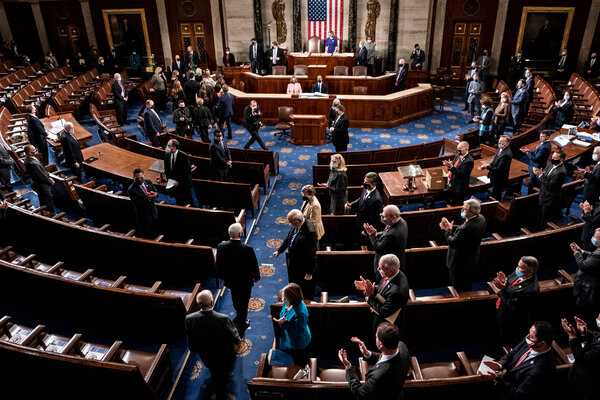

Emily Cochrane
As a congressional reporter, you assume being around the members is the safest place to be — I actually remember telling my family that the night before, when someone expressed concern about me going that day.
Nick, I remember you had left to go join Luke in the Senate chamber around 1 or so, and I stayed back in the House. The big difference there meant that, because of the different rules, I could have my phone and laptop on me and you guys couldn't, so I was able to see footage from outside and get the warnings in a way that you were not, right?
Read more

Nicholas Fandos
Yes, I was in the House chamber to watch the vice president and speaker of the House gavel in that proceeding. But I quickly raced back to the Senate to watch it debate the first objection. I remember Mitch McConnell had just delivered an astounding speech about how Trump's lie, if sustained, would unleash a whirlwind on American democracy. Honestly, it was still running through my head when things started getting out of control.
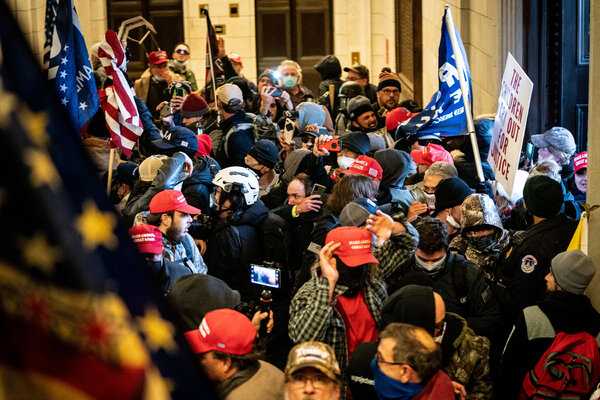

Luke Broadwater
Right, McConnell had been waiting for that moment to condemn Trump and the big lie, and he had built up to what he hoped would be this powerful speech. But the damage had already been done; the mob was already amassed. That seems like such a miscalculation in retrospect.

Nicholas Fandos
It was just after 2 p.m. that I noticed something weird was happening inside the Senate. I had been sitting at my desk in the press gallery a few yards away and decided to run into the ornate chamber to get a look for myself. Just as I stepped in, the vice president had been evacuated and debate was grinding to a halt. Luke came in, too. Within minutes, the big wooden doors of the chamber were shoved shut. We were locked in. A police officer with a machine gun took command of the room.
I started texting my editor about what was happening. But I really had no idea. I just remember scanning from door to door, the way I would usually do to see which senator was coming and going from a vote. This time I was looking to see if any door was about to be battered down.
Luke, I'm curious what you remember of that room. It was kind of eerily calm despite palpable panic. And Emily, it turns out you were in the House chamber at the very same time, though I did not know that until quite a bit later.
Mitt Romney was irate. I remember him saying something like, "This is what you got us, guys," to his fellow Republicans. Patrick Leahy, the longest-serving Democrat, is an avid amateur photographer. He was snapping pictures until police asked him to stop. I've often tried to imagine what they must look like. Amy Klobuchar eventually called out that shots had been fired elsewhere in the building and that shut everyone up.
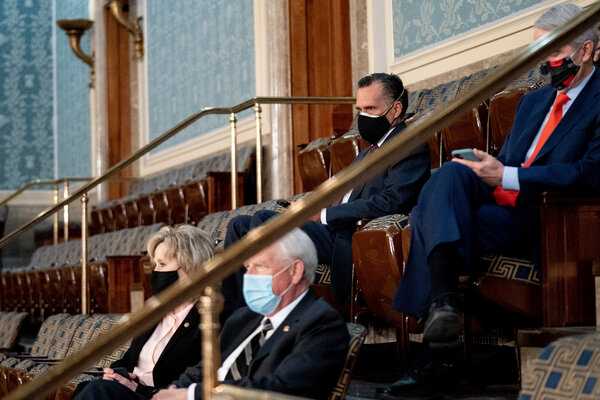

Luke Broadwater
I remember personally being very angry. We had been reporting for weeks that all these claims of widespread election fraud were bogus, and it was kind of maddening that so many people were believing obvious lies.
But the room was so calm.
I felt the press had a better sense of the danger than the senators.
I remember Amy Klobuchar speaking up and saying someone had been shot.
And then that really seemed to grab everyone's attention.

Emily Cochrane
When the House locked down, soon after the Senate, and recessed — you knew something was serious when Pelosi and party leaders were taken out of the chamber. I will never forget Dean Phillips, a Minnesota Democrat — normally a pretty calm, cheerful guy who prides himself on being able to reach across the aisle — standing in the gallery, normally reserved for visitors and tourists, bellowing across the House to Republicans, "This is because of YOU."
Floor staff was trying to calm everyone down, but clearly people were rattled.

Nicholas Fandos
Not long after the lockdown, officers abruptly moved all the senators to the middle of the chamber, and we all began evacuating, down to the Senate basement. We met up with a phalanx of senators and staff there rushing under armed guard through subterranean tunnels and followed. An image remains seared in my mind of Mitch McConnell, the most powerful Republican in Congress, who suffered from polio as a young man, essentially being carried to safety by his security detail.

Emily Cochrane
It was the same thing in the House. Press staff had been quietly telling us to grab our things, bring them into the chamber, and pointing out the exits where we would need to run. But lawmakers kept on with the debate.

Nicholas Fandos
Luke and I ended up in a safe room elsewhere in the Capitol complex with much of the Senate and their senior staff. It was a surreal scene. It almost felt like a school fire drill. The Senate chaplain offered a prayer. Republican allies of the president were furiously trying to reach White House contacts. I remember a debate over whether the Senate should reconvene on the spot to resume debate and move toward confirming Biden's victory. It was mayhem, and SWAT teams kept pouring in.

Emily Cochrane
Democrats tried to resume debate in the House, and that quickly ended when an official came and said that tear gas had been sprayed in the Rotunda and lawmakers should prepare to take shelter. It's just pandemonium. The House chaplain — barely a few days into her new job — at one point is praying. Suddenly, people are pulling out these emergency escape hoods — basically a crumpled bag attached to this whirring machine — Ruben Gallego, an Arizona Democrat and a war veteran is standing on top of the chairs telling people how to use them. Lawmakers and security are pushing this big chest in front of the chamber doors — the ones Mike Pence just walked through! — to barricade us in.
I just remember crouching behind the gallery desk, struggling to open this box holding my escape hood, and then we start moving, people are yelling to get out of the chamber. There are these gold railings that separate the sections of the gallery, so I remember grabbing my laptop, my phone, a charger and just scrambling to get out, stepping on the seats, banging my knees. What's faster — over the railing? Under the railing? I literally pulled this woman under a railing to help her get through.
The thing that's seared in my mind is looking out from behind this chair and seeing the security detail with their guns drawn pointing at the shattered window of the chamber door. I texted my editor: "Guns drawn.” You could see people on the other side, through the shattered window, yelling, people trying to reason with them. I texted my loved ones that I loved them, because in that moment, I just feared that people would start shooting.
I remember turning the corner of the chamber — I can now see the exit — but then there's this bang and we all just drop to the floor. "GET DOWN." I'm on the top of the staircase, and I remember trying to think whether I would be more covered by this auditorium chair or the cluster of the CSPAN cameras at the bottom of the staircase. But I decided not to risk the exposure of scrambling down those stairs.
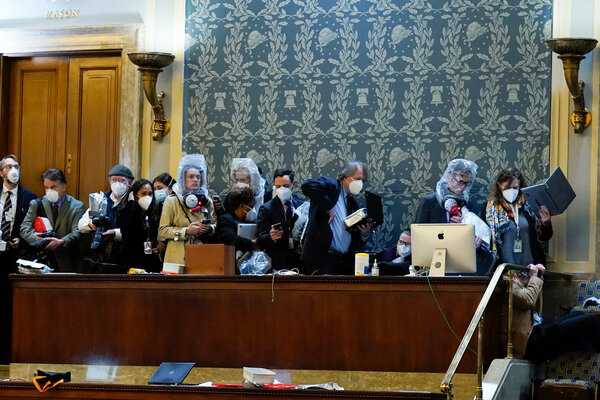

Luke Broadwater
And through this all, we're reporters, right? So it's not enough just to take photos or notes or tweet. We had to be writing stories. So we're sitting in this sequestered area on the floor trying to file coherent copy.

Emily Cochrane
We ultimately got out of the House chamber, we're scrambling down these staircases — I didn't look, but had I looked to my right I would have seen the rioters on their stomachs, held at gunpoint, outside the gallery door. We ended up sheltering elsewhere in the complex, and the thing that haunts me about that is that we all had these gas masks, still whirring all around us. I kept mine, but I am very glad it doesn't make that noise anymore.
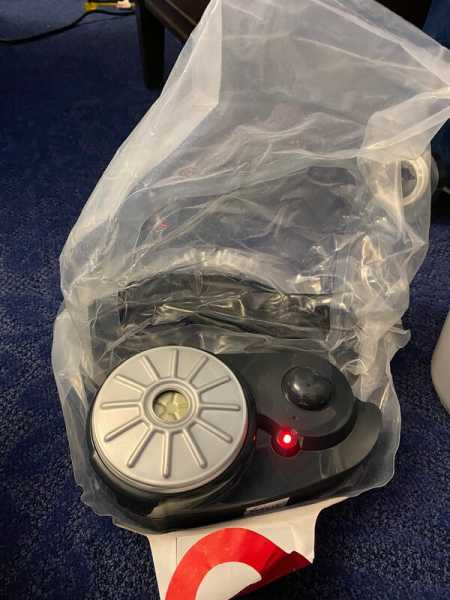

Luke Broadwater
I do remember, initially, they had the press in the same room as the senators — and I don't think all the lawmakers necessarily liked all us watching their every reaction, and they ended up putting the press in different area just outside the door.
As we were sequestered, I remember more and more officers arriving from different agencies with SWAT gear and long guns. There were rumors they would put off the counting of the electoral votes or do it in some secret location. And then eventually there was an announcement that the building was cleared, and Klobuchar and Blunt got up in front of the room and said we were all going to the Senate to finish the count.
We walked back alongside the aides who were carrying the box with, literally, the electoral votes in them.
It was a historic moment and one I'll never forget. They had rushed them out, fearing the mob would steal or burn them.

Nicholas Fandos
When we finally returned to the Capitol, it was a triumphant moment, I suppose. The police had retaken the building and lawmakers were adamant they would lock arms and complete what they had started to declare Biden president-elect. But mostly it was tragic. We walked past abandoned SWAT gear, the beautiful marble floors of the Capitol were caked in debris, windows were shattered. Everywhere, the detritus of an insurrection.
I was wearing new dress shoes that day. They ended up caked in debris and got badly scuffed during the evacuation. I've decided to leave them be as a small memory.
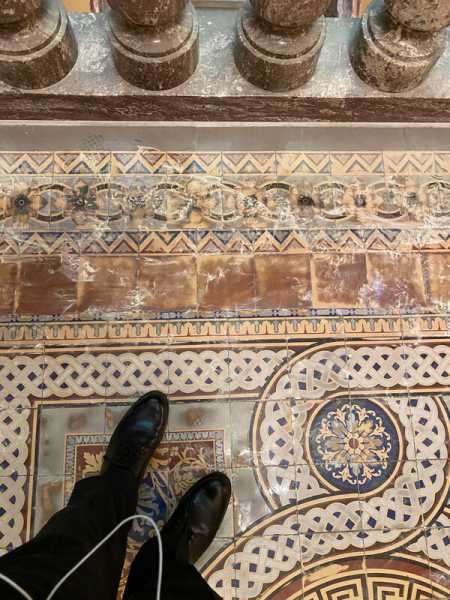

Emily Cochrane
Nick, do you remember walking around in the wee hours, in between debate? It was just surreal, we were all in shock. It's hard to explain, but as a reporter, you spend so much time in these halls, that are just filled with historic artifacts and tributes to our history, and you treat the place with a certain amount of reverence. Now, there's glass everywhere, there's blood, urine, god knows what smeared on statues and the floor. There's garbage and trash everywhere, and then there's just police everywhere. Exhausted, drained, with guns propped against them or the wall. I mean, you just couldn't believe what you were seeing.

Nicholas Fandos
I remember seeing a spent defibrillator and syringes on the ground, Emily. I still wonder whose life they saved – or didn't.
In the year since, as investigations have turned up greater and greater detail about what happened it’s become clear how close we came to a much worse outcome. Had just a few things gone differently, or been better planned, I shudder to think what might have happened.
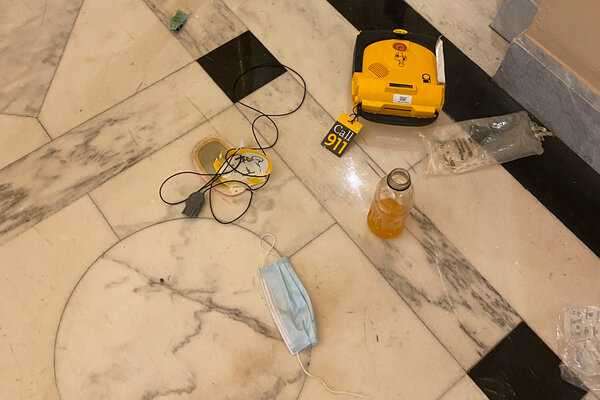

Emily Cochrane
Of the many what ifs of the day, I think the one that haunts me the most is — how many more people would have been there, had the pandemic not forced the building to be closed to the public or a limited presence? Just a few staff were limited on the floor, lawmakers were largely either kept spaced up in the gallery or instructed to wait to come to the floor for votes, and even reporters in the gallery were smaller — you can normally pack around 100 of us in there for State of the Unions, etc., and we were down to around 30.
The next day, just seeing throngs of National Guard troops sleeping — SLEEPING! — in the Capitol. I never thought I'd see that.
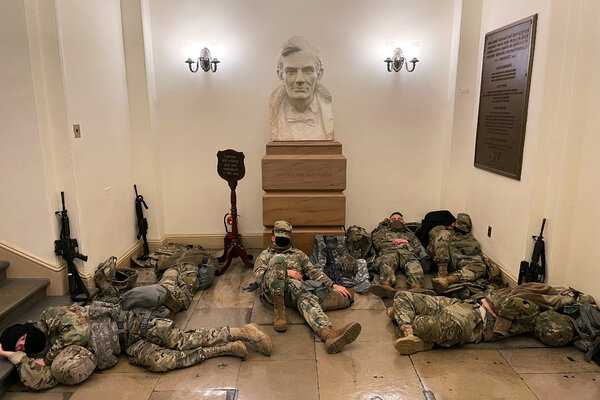

Nicholas Fandos
There was no doubt that night who was to blame. Republicans and Democrats largely locked arms to vote down the spurious challenges to Biden's victory and denounce President Trump. Perhaps one of the most consequential things that has happened in the year since is Republicans sharp reversals. Of course there were signs that night. The majority of House Republicans voted to toss out the results of a democratic and fair election. But in the months since, there has been a concerted and wholesale recasting of what happened to avert blame from Trump, to re-elevate the lies that fueled the riot, and so on. We are all still covering it in one way or another.

Luke Broadwater
As reporters, we're all still grappling with Jan. 6 and its aftermath. It was a hell of a thing to be a first-hand witness to, and a reminder of how fragile democracy can be. I have a lot of respect for everyone who fought off the mob that day and kept those of us inside safe.
Source: nytimes.com



